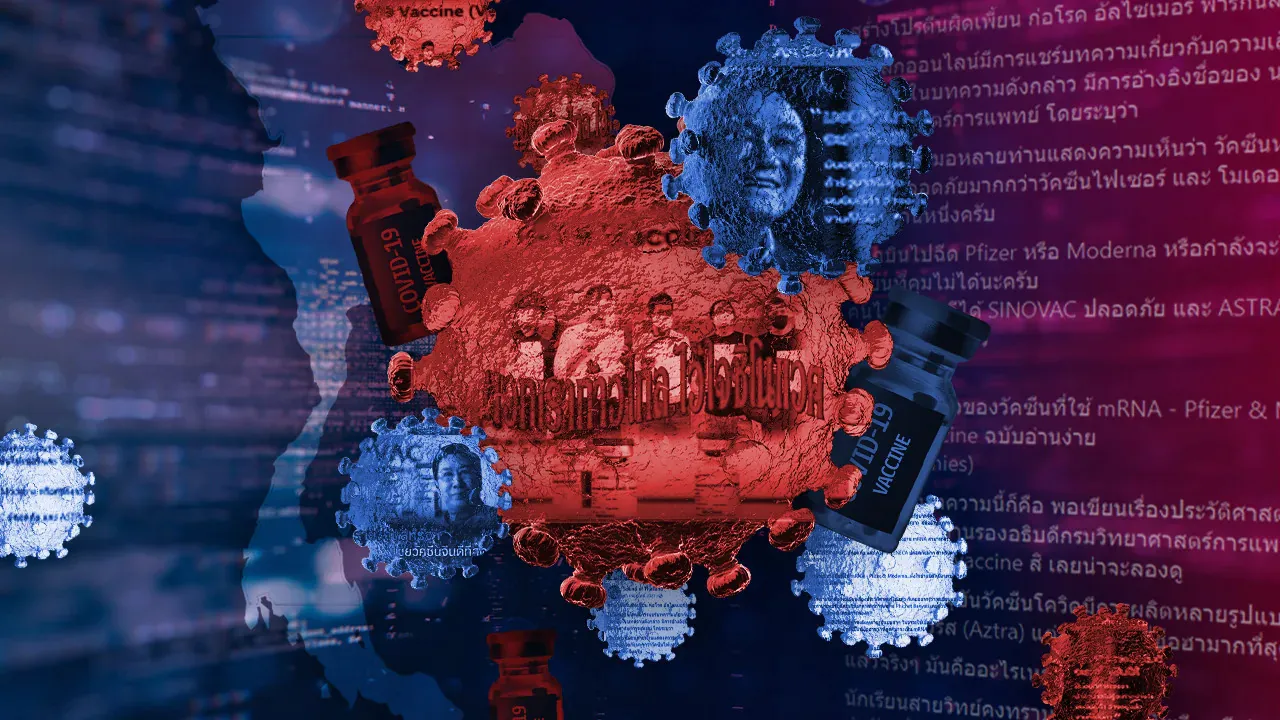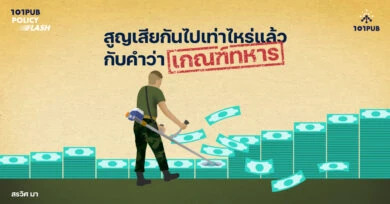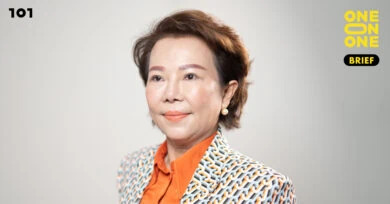Rappler – Cover Image
Online warriors of the military government mount hybrid information operations to justify government’s vaccine plan and drum up public support
— First of two parts —
“Reported by the New York Times, in the safety ranking, the top four are all Chinese vaccines: 1. Sinopharm (China) 2. Sinovac (China) 3. Kexing (China) 4. Can Sino (China) 5. AstraZeneca (UK) 6. Pfizer (United States and Germany) 7. Moderna (United States) 8. Johnson & Johnson (United States) 9. Novavax (United States) 10. Satellite 5 (Russia)…”
This was broadly circulated in Thai language across Thai Facebook at the height of the COVID-19 pandemic, middle of 2021, with a link to a New York Times opinion piece, It’s Time to Trust China’s and Russia’s Vaccines, which was published on February 5, 2021.
The problem is, this isn’t true.
The New York Times had to tweet on March 10, 2021 that “This message is misleading and untrue,” adding that “The New York Times did not publish this list, our reporting has not suggested that Chinese vaccines are superior to vaccines produced elsewhere…”
Despite this, the false claim continued to be shared in the next 8 months on Facebook, or at least until November 2021, based on data from social media listening tool CrowdTangle. The spread went beyond Thailand and reached Hong Kong, Taiwan, the Philippines, Russia, Malaysia, Indonesia, among others.
It was first found in Thai language on Facebook on May 7, 2021 in a fan page called ‘เสียงชาวบ้าน วิชาการของชาวบ้านเพื่อชาวบ้าน’ (Voices of the Grassroots, Knowledge of the Grassroots for the Grassroots). The spread was last noticed on September 23, 2021, with a total of 231 posts, excluding those in various public groups.
We identified three major clusters of this disinformation: posts that attribute the claim directly to the New York Times’ article; those that attribute the claim directly to the New York Times’ article and to a supposed link, which is now inaccessible; and posts that shared a news article published in July 29, 2021 by TOP News, a Thai right-wing media, which carried the headline “Dr. Arthit posted: the U.S. admitted the best vaccine was the China’s.” The article has since been deleted. (Dr. Arthit Ourairat is a well-known ex-minister and ex-dean of Rangsit University).

Another disinformation during the same period focused on posts that twisted facts about mRNA Covid-19 vaccines and warned the public that they could generate “misfolded protein” with adverse effects. Some posts even compared the mRNA vaccines to GMO agricultural products.
Dr. Phichet Banyati, a Thai doctor whose supposed statement was twisted, confirmed on his Facebook fanpage on May 29, 2021 that “the widely-shared message does not align with the original one because misunderstanding has been added.”
Yet, this half-truth continued to be shared on Facebook until July 29, 2021.

Right: An example of posts claiming that mRNA vaccines were not safe.
The lies and half-truths about COVID-19 vaccines in Thailand also spilled over to other social media platforms such as Line and Twitter. They coincided with the doubts that many Thais had on the effectiveness of vaccines in combating the virus, as well as the vigorous debates about which vaccine was better – mRNA vaccines or others.
Individual disinformation actors
The COVID-19 pandemic sparked a great divide among Thais on the issue of vaccination – whether it’s effective in the first place, and if it was, whether those available for use were safe.
This divide reflected Thailand’s polarized politics. And Facebook’s algorithms exploited and exacerbated it. At least 56.85 million Thais – 81.2% of the population – are on social media, and 50.5 million of them are on Facebook, based on latest estimates.
Thais found themselves caught in their own echo chambers that reinforced their beliefs in COVID-19 vaccines or misunderstanding of them. Facebook’s algorithms tracked users’ online activity before directing them to content that matched their interests, thereby limiting users’ ability to see things that contradicted their views.
We looked into conversations about vaccines across selected pro-regime Facebook pages and groups in 2021 until early 2022 and drew the following conclusions:
- Plenty of those vaccine-related posts were echoed by similar pages and groups, and many of the amplified messages were discovered to be “inauthentic behavior” that appeared to conform to the playbook of the information warfare fueled by the military regime.
- These posts were promoted by individual social media accounts, so-called independent actors who pushed for the regime’s programs and attacked its opponents through lies.
- The disinformation on vaccines and COVID-19 still served one goal, which was to prop up the regime and discredit those opposed to it.
The disinformation on mRNA vaccines, for example, shows that the most viral ones were promoted and shared across pro-regime pages, groups, and accounts, as shown in the network graph below.
Military coup in 2014
In Thailand’s political context today, the pro-regime bloc could be defined as those who support the powerful role of non-democratic institutions such as the military and the monarchy and prefer limited roles for elected politicians who they believe are corrupt.
The pro-regime camp supports the incumbent regime of ex-military commander Prayut Chan-o-cha, who led the 2014 military coup against Yingluck Shinawatra’s civilian government, and is now prime minister.
The coup showed once again the armed forces’ ambition to rule and govern Thailand, with the generals applying information warfare – used for decades – to drum up public support for them. Thai netizens are well acquainted with the military’s information operations as applied on social media. They call it “IO” and widely suspect that the Thai army is behind them.
According to Aim Sinpeng, a senior lecturer in comparative politics at the University of Sydney, the information warfare after the 2014 coup is different from past military adventures because of social media – and how the military has seized it as an integral part of its strategy to bolster public support and discredit critics.
In defense of government
As in many governments all over the world, COVID-19 brought about new problems for the Thai regime. Critics went to social media to again question the legitimacy of the Prayut government and to cite its inefficiencies in handling the pandemic.
Unlike today when vaccine options for Thailand are now diversified, the government’s vaccine supply back in years 2020 and 2021 relied on only two vaccine brands – Sinovac and AstraZeneca – with no clear sign of importation of the mRNA vaccine brands, which were scientifically proven to be more effective in combating the then-dominant Delta variant.
Amid widespread public condemnation of the government’s pandemic response and allegations of corruption and cronyism, pro-regime netizens used Facebook to defend the government by spreading disinformation that highlighted the benefits of the vaccines that the government had supply of while discrediting others.
This could be seen in captions of fake news posts which included texts, for example, “many doctors have opined that the… vaccines procured by the government are safer than Pfizer and Moderna in the long run.” Aside from the use of fake news, there were several narratives legitimizing the government’s vaccine procurement plan and attacking the critics.
Defending government
Our investigation tracked vaccine conversations in 92 Facebook pages and 71 groups which supported the regime – from January 1, 2021 to March 16, 2022 – and found frequently applied keywords, most of which were aimed at countering those opposed to the government’s vaccine plan.
Many of the keywords referred to trust in the government-supplied vaccine, for example, such as ‘เชื่อหมอไม่เชื่อหมา’ (Trust Doctors, Not Dogs), ‘ใครไม่ฉีดกูฉีด’ (I will be vaccinated no matter who rejects), and ‘วัคซีนที่ดี คือวัคซีนที่มี’ (Good vaccines are vaccines we have already had). One keyword, ‘saveหมอยง’ (Save Doctor Yong), was used to defend a medical professor and adviser to the government in the pandemic response, Dr. Yong Poovorawan, who was widely criticized for exaggerating the efficacy of government-supplied vaccines, especially Sinovac.
Other keywords were directed at critics of the government’s vaccine plan. They included ‘ด้อยค่าวัคซีน’ (Devaluing Vaccines) and ‘หยุดเห่าเพื่อชาติสักครั้งเถอะ’ (stop barking for the nation just once), which blamed Thais who kept questioning and casting doubts on the efficacy of the vaccine brands procured by the government, and ‘วัคซีนเทพ’ (angelic vaccines), which was used in a satirical sense to refer to those who appreciated the mRNA vaccines.
The other two popular keywords were ‘วัคซีนพระราชทาน’ (royal vaccines) and ‘วัคซีนvip’ (VIP vaccines), which targeted a leading critic, Thanathorn Juangroongruangkit of the Progressive Movement and former leader of the dissolved opposition Future Forward Party.
Debates heat up
Vaccine conversations online began to heat up in mid-January 2021 after Thanathorn Juangroongruangkit broadcast on Facebook live his criticism of government’s vaccine procurement strategy, questioning the decision to give a company associated with the royalty the exclusive rights to produce and distribute AstraZeneca vaccines. The keywords ‘วัคซีนพระราชทาน’ (Royal Vaccines) and ‘หยุดเห่าเพื่อชาติสักครั้งเถอะ’ (Stop barking for the nation just once) gained traction, as part of efforts to bury this criticism.
In May-September 2021, when the national vaccination program began, Facebook was again filled with discussions on the issue, as shown by the rise of certain keywords in the monitored pages and groups during this time. A significant increase in vaccine-related conversations was seen again in January 2022, when the use of the keyword ‘วัคซีนvip’ (VIP Vaccine) skyrocketed, following the spread of the false claim that Thanathorn cut the vaccination queue for priority groups such as the elderly and the sick.
An analysis of the keywords used in the monitored pages and groups shows that they amplified each other’s messages and extended to government-related pages and groups, as illustrated in the network graph below. They show inauthentic behavior that syncs with the information operation playbook of the military regime, carried out by both official and private accounts.
For example, we found one page whose contents were actively shared across the monitored pages, ‘ช่างแพล่ม’ (Changplaem), with total shares at 36 in the selected period of time. The sharing pattern seemed abnormal.
An example is a photo which mocked members of the opposition Move Forward party for receiving the Sinovac vaccine even if their party raised suspicions about the government’s purchase of the brand and its effectiveness against the Delta variant. The photo below was posted at 12:49 pm (ICT) on May 13, 2021 and got 11 shares, six of which are in the monitored groups. Those six were found to be shared by three Facebook profiles – Pichaiwat Mongkoljuthakom, กัมพล โชติสุทานันท์ (Kampol Chotsutanan), and นวพล ก้องเกียรติโสภา (Nawapol Kongkiatsopa) – at about the same time between 9:29 – 11:25 pm.

Another cluster studied was a post on the World Health Organization (WHO)’s press release announcing the validation of Sinovac for emergency use, with a caption emphasizing the advantages of the Chinese brand.

This was posted at 10:14 am on June 2, 2021, and was shared 8 times to the monitored groups. Six out of those were shared by one profile named มะปราง พัทธมน (Maprang Pattamon) within only two minutes from 10:22 am to 10:24 am on June 2. The other two shares were by a profile ‘กรณ์ กรนันท์วิจิตร’ (Korn Kornantvijitr) and Kampol who was related to the previous cluster at 1:30 pm and 2:13 pm on the same date, respectively.
They all actively shared posts from Changplam to many of the monitored groups. Three individual profiles – Pichaiwat, Kampol, and Korn – shared the same creation date, August 27, 2020. Nawapol’s was created just two days before, while Maprang’s created date was around two months further on Nov 3, 2020. It was also discovered that Pichaiwat, Kampol, and Korn were friends with one another.
Using Google reverse image search on the profile photos of the five, we found that photos of four – except Maprang – were sourced from foreign news websites. For instance, Nawapon’s profile photo was an engineer in China appearing in the New York Times’ article, while Kampol’s was a reviewer of a Vietnamese herbal drug brand. Changplam was not the only page they shared to the monitored groups. There were four more pages – แดนสนทนา (Dansonthana), เยาวชนอดแดก (FailYouth), แพล่มการเมือง (Plamkarnmueng), and การเมือง (KarnMuengTalk).
All these five pages were related. FailYouth posted on its page that Dansonthana was its backup, while the other three pages applied the same artwork for their profile and cover photos. Majority of the content on these pages was directed towards anti-government figures. These pages also occasionally shared content between one another.

Throughout 2021, there were 6,184 posts shared from these five pages to the monitored pages and groups, according to CrowdTangle.

Most of the posts were shared in pages and groups in a matter of minutes – with amplifiers numbering 42. All the 42 Facebook profiles we studied were found to share common practices:
- They actively flooded posts shared from the five pages to many pro-government groups.
- Most of their accounts were created during Aug 22-27, 2020, when Thailand’s political conflict began to heat up after pro-democracy youth movements made an unprecedented call for monarchy reform.
- They had similar liked pages, mostly pro-government pages.
- Their photo albums generally had only one profile photo and one cover photo.
- Their profile photos did not represent their true identities as many were found being sourced especially from foreign websites or stock photo websites.
- Some accounts used the same photos such as the former profile photo of Maprang Pattamon, a duplicate of the profile photo of another account, ‘แคท ศิศิรา’ (Cat Sisira), and these two were posted on the same date Nov 3, 2020.
- Accounts created during Aug 22-27, 2020 showed their identities as males, while those created before and after were as females.
- They had only ten or a few hundreds of friends, and many of them were friends with one another.
Did all these accounts follow the military’s IO playbook?
Reality more complex
“A common perception is that every anti-opposition troll on Twitter or Facebook originates from the military IOs. However, this assumption is only half the story,” wrote Janjira Sombatpoonsiri, an assistant professor and project leader at the Institute of Asian Studies, Chulalongkorn University.
“In contrast to the assumption that royalists on Twitter are mostly regime-backed IOs, the reality is more complex and many royalists who troll the opposition online sometimes appear to be someone’s father, mother, sibling and teacher,” wrote Janjira. “These royalists who troll the opposition appear to be genuine accounts, rather than those manufactured for the purposes of IOs.”
Janjira called this kind of “independent IOs,” to distinguish them from organized IOs. While the organized IOs’ accounts can easily be caught via their stolen profile photos, very few or empty details in bios, sparse number of friends, and weird posting activities, the independent IOs’ seemed to have actual people operating them.
The profiles which were found to conform to self-driven IOs were not newly created, with many older than five years. Their profile photos appeared to match their personal images and were updated on a regular basis. Furthermore, their profiles had many hundreds or thousands of friends, and contained posts or photos about their lifestyle.
Nonetheless, what was unique in these profiles was their presentation of pro-regime stances in their bios, profile photos, cover photos, or even profile names. For example, some includes photos of the Thai flag or nationalist text in their profile or cover photos, and some showed their profile surname as ‘รักในหลวง’ (Love the King).
“One caveat is that it remains difficult to assess the extent to which these independent IOs are linked to the regime beyond mere ideological associations,” Janjira said.
(Next: When online IOs integrate with offline operations)
ผลงานชิ้นนี้เป็นความร่วมมือระหว่างสำนักข่าว Rappler และ The101.world
เผยแพร่ครั้งแรกทาง https://www.rappler.com/newsbreak/investigative/thailand-information-operations-exploiting-covid-19-suppress-dissent/
ติดตามเนื้อหาภาษาไทยได้เร็วๆ นี้



